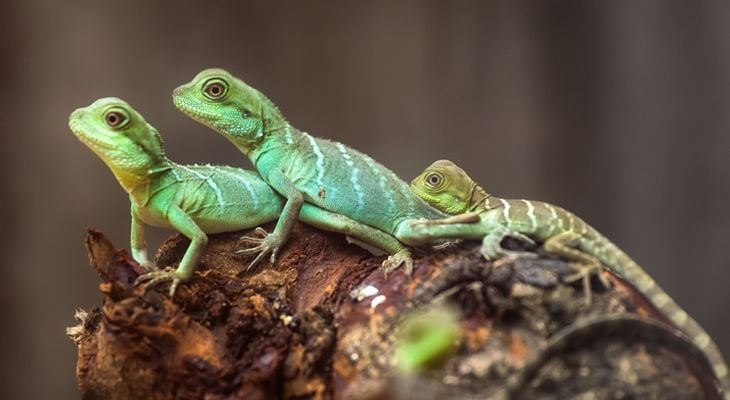Looking for ways to support your local animal shelter?
Read more

People with limited living quarters may find that reptiles such as lizards or turtles fit perfectly into their lifestyles. Before deciding on a reptile, learn as much as possible about them and their needs. Poisonous snakes and certain reptiles should never be kept as pets. Ask your veterinarian about the suitability of a particular animal before you make your decision. There are many things to consider before committing to a reptile as a pet.
Finding out if a Pet is Legal Where You Live
Many areas have enacted laws pertaining to keeping reptiles. Some are general and some are quite specific; in many places any reptiles that are considered dangerous (venomous snakes, alligators, etc.) are illegal but some places are even more restrictive (for example, in some states all constricting snakes including ball pythons are illegal).
Salmonella Risks and Prevention
All reptile owners need to be informed about Salmonella infections. While the risks shouldn't keep most people from keeping reptiles since with the proper management the risks are minimal. Still, owners should be aware of the risks, and the US Centers for Disease Control recommends that certain risk groups should be careful about contact with reptiles and amphibians.
The Importance of Light and Heat
Many problems with keeping reptiles can be traced back to not providing the proper environmental conditions, particularly heat. Proper lighting is also important for many reptiles. The equipment to provide the proper heat and light to captive reptiles is often quite expensive, but is absolutely essential to keeping pet reptiles healthy. It is important to find out exactly what conditions your reptile needs and never cut corners when it comes to meeting those conditions!
Why Choose Captive Bred Reptiles
There are numerous reasons why you should pick a captive bred reptile if at all possible, as explained here.
How to Pick a Healthy Reptile
It is important to keep in mind that depending on where you get a reptile, it may be very stressed, dehydrated, and prone to illness. Here are some items to look for when buying your reptile to increase the chances of picking out a healthy pet reptile.
While there are many types of reptiles that could be good pets, here we cover a few you could consider.
-
November Newsletter: National animal shelter appreciation week
Category: Newsletter Library
-
Three Reasons to Always Microchip Your Pets
Category: Newsletter Library
-
Bad Breath Can Indicate Your Pet Needs Dental Care
Category: Newsletter Library
-
Happy Cat Month
Category: Newsletter Library
-
Beware of Ticks this Fall
Category: Newsletter Library
-
How to Tell When Your Cat Is Sick
Category: Newsletter Library
-
Vet Care Doesn't Have to Break the Bank; Pet Insurance
Category: Newsletter Library
-
Human vs Pet Medications: Why You Should Never Share Medicine with Your Pets
Category: Newsletter Library
-
Ways to Take the Stress Out of Your Pet's Next Veterinary Visit
Category: Newsletter Library
-
Signs on Heatstroke: Keep Your Pets Safe This Summer
Category: Newsletter Library
-
Why Heartworm Protection Is Necessary for All Pets
Category: Newsletter Library
-
Cat-Safe House Plants
Category: Newsletter Library
-
Feline Skin Allergy Symptoms and Care
Category: Newsletter Library
-
The Next Step
Category: Living With Your Pet, Saying Goodbye
The grieving process includes accepting the reality of your loss, accepting that the loss and accompanying feelings are painful, and adjusting to your new life that no longer includes your pet. How do I tell my family? Family members usually are already aware of a pet's problems. However, you should
Read more -
Battling Canine Cancer
Category: Video Newsroom, Health Topics
Every day, Cindy Fleischner lines up her crew of cuddly canines for breakfast. As the four other dogs eat, Cindy pulls Katy, her 12 year old Shepherd mix aside for a peanut butter treat. Katy is battling lymphoma and this treat hides her daily dose of chemotherapy drugs. Katy is not alone in this war.
Read more -
Gastroenteritis in Pets
Category: Newsletter Library, Recognizing Illness
Lengthy bouts of vomiting and diarrhea can be a sign that your pet has gastroenteritis, a common condition that occurs when the lining of the stomach and intestines becomes irritated. Since frequent diarrhea and vomiting can lead to dehydration, a visit to the veterinarian is a good idea if you notice
Read more
